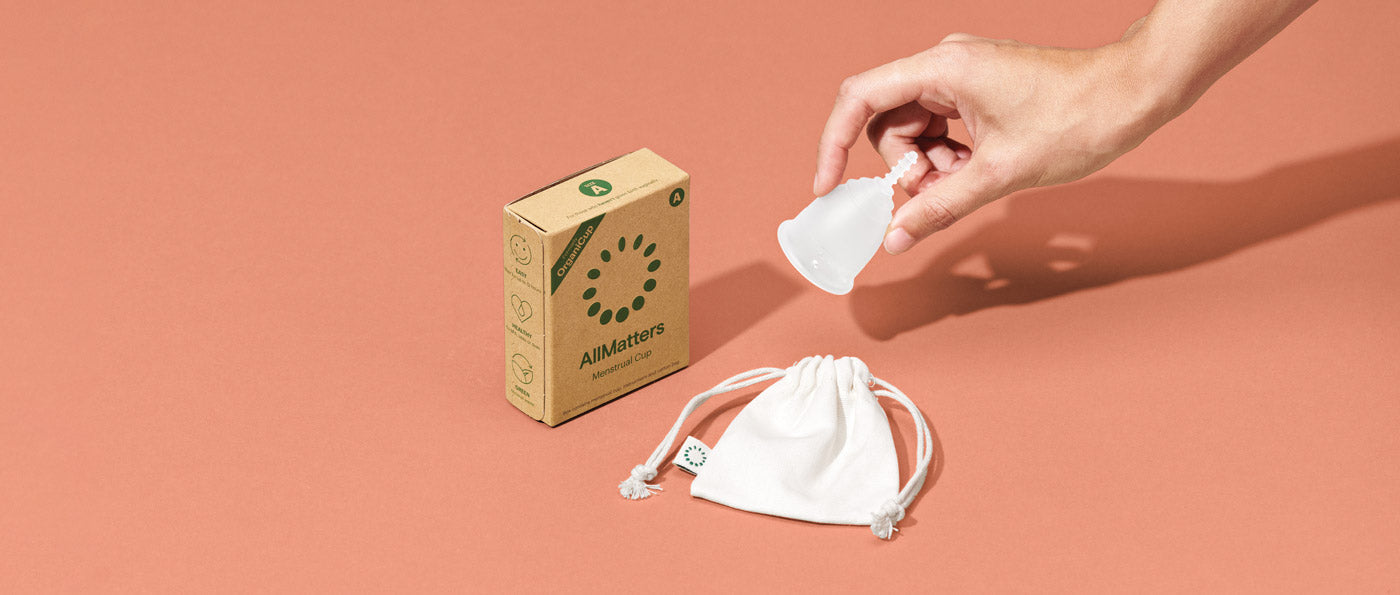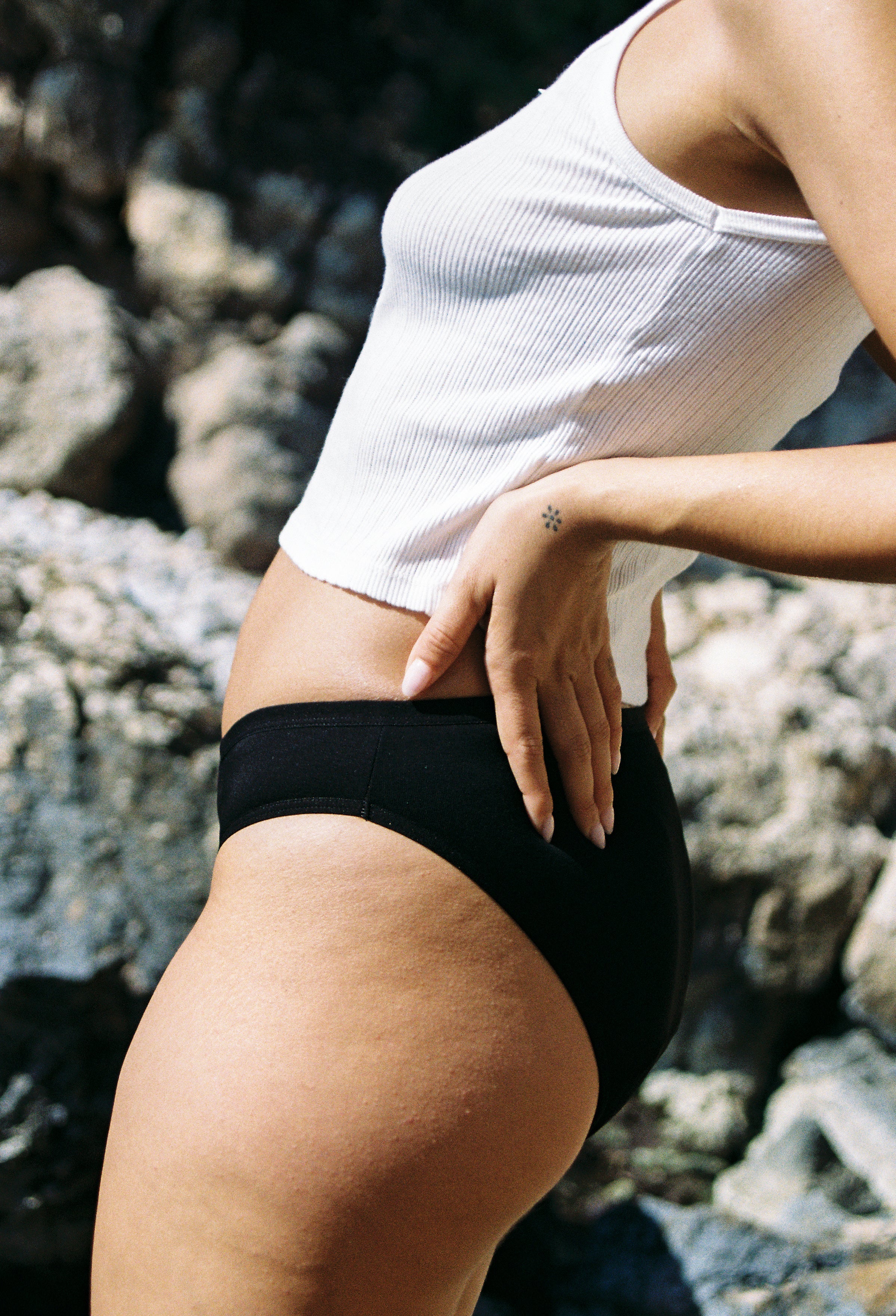Menstrual cups are becoming an increasingly popular choice around the world. But what are the pros and cons of menstrual cups?
And are there any significant pros and cons regarding using menstrual cups instead of conventional products that you haven’t already considered?
Keep reading to explore the pros and cons of menstrual cups, and how they measure up to disposable menstrual hygiene products.
Pro: Reduce, reuse, recycle
Probably the most persuasive benefits when it comes to pros and cons for menstrual cups is the positive effect that cups have on the environment.
A menstrual cup does not produce any waste in the form of single-use, disposable packaging. So, switching to reusable menstrual hygiene products is a step in the right direction for the environment.
Every little action helps, and by using a menstrual cup, you could save 528 tampons/sanitary pads in 2 years.
With the AllMatters cup, the cup is packaged in a minimal box made of recyclable carton. Also, all instructions and directions are printed directly onto the carton, keeping waste to a minimum.
Want to read more about the environmental impact of tampons and sanitary pads? Check out our impact page here.
Pro: Don’t splash your cash
A box of tampons or pads can be expensive, especially when you need to buy a new box every month. In the US, the average individual will spend over $1,000 on menstruation products during their lifetime.
However, by using a menstrual cup, you can save money and not have to think about purchasing tampons or pads every month.
The AllMatters cup’s material has been tested to last up to 10 years, meaning that your single purchase can last a long time, without you needing to purchase disposable pads or tampons.
You may notice that your cup becomes discoloured or stained after a while, which is perfectly normal.
But, even if you do decide to replace your cup after a few years, you will still have saved money on buying disposable tampons and pads.
Pro: Change isn’t always good
The manufacturers recommend that you change your tampon every 4 to 8 hours, and pads normally every 8 hours or so.
One of the many benefits of a menstrual cup is that you can wear it for up to 12 hours. This is due to the larger capacity of a menstrual cup, which is a strong advantage.
A night pad can hold between 10 to 15 millilitres of blood, whereas a super-absorbent tampon will hold 12 millilitres of fluid.
Depending on the size of your cup, the capacity can range from 25 to 30 millilitres. This means that you can go longer without having to empty your cup.
Pro: Keep everything in balance
We all know how important vaginal health is. Any slight disruption in the body such as stress, diet or medication can cause an imbalance.
Pads can create a warm, moist environment that encourages the growth of bacteria and can increase infections. These undesirable bacteria can end up causing a lot of discomfort and irritation.
On the other hand, tampons can also upset your body’s natural pH-balance. The high absorption in tampons can absorb all the natural (good) bacteria from your vagina, as well as menstrual blood.
The removal of this good bacteria, as well as blood, could create an imbalance in your pH level. A menstrual cup does not absorb anything but instead collects it.
So, any natural fluids that are produced by your body are collected and then emptied later — there’s no over-absorption, dryness, or discomfort.
This leaves you with a well-balanced, happy vagina. A pretty good pro when it comes to the pros and cons of menstrual cups.
Pro: No odour
Unfortunately, when blood is exposed to air, it has an unpleasant odour. And if you use pads, there is no way to prevent this from occurring. Even though it is completely natural, it’s something that many feel embarrassed about or ashamed of.
But there is a way to reduce odour and feel more confident during your period.
One of the great benefits of using a menstrual cup is the reduction in odour.
Since a menstrual cup collects the blood inside your body, the blood is not exposed to air. And, since there is no prolonged exposure to air, your blood cannot produce an odour.
Now that we’ve talked about the pros of menstrual cups, let’s move on to the potential cons of using a menstrual cup.
Con: Insertion takes time
Just like when you first used a tampon, although you think it will be easy, it actually turns out to be a lot harder than it looks.
But after using them during your next few periods, it becomes so much easier. You start to get the hang of it. Your body begins to relax, and before you know it, you can change your tampon with your eyes closed.
It’s the same with a menstrual cup. It takes a few times to get the hang of it. But once you’ve gotten the hang of it, you will be able to empty and re-insert your cup with no problem.
Some people might see this as a con, as it does take some practice, and it might take some time. But trust us, you will get there! Check out our step by step guide here for more information.
Con: Cleaning your cup
Unlike disposable menstrual products, you need to take care of your menstrual cup. This means sanitising your cup between each menstrual cycle and checking for signs of wear and tear. However, there is no need to sanitise your cup every time you empty it during your period. Dr Nathan Riley explains that the menstrual cup can be removed and replaced without cleaning and this will not increase the risk of infection.
But once your period is finished, you can easily sanitise your cup in boiling water for 3 to 5 minutes – just be careful not to burn the silicone. This could be seen as a con in the pros and cons of using a menstrual cup argument – but at least you can rest assured that your cup is ready and clean for your next menstrual cycle. Read more about cleaning your cup here.
Con: It can be messy
Inserting and emptying your cup means that you have to use your fingers. You really have to get in there and feel around.
For some, this can be quite intimidating, especially if it is your first time. But after a while, you get used to it.
When you empty your cup, you may find it interesting to see how much blood your body produces, as part of its natural rhythm.
This could be seen as both a pro and a con for menstrual cups. Once you get used to using your hands, you will begin to realise just how amazing the human body really is.
The pros and cons of menstrual cups are many, but what do you think?
So, whether you are a seasoned cup user or a beginner, there’s no denying that the innovation and design behind menstrual cups are brilliant.
Maybe listing the pros and cons of menstrual cups has convinced you to try a cup or perhaps it confirmed what you already knew.
Menstrual cups are a great choice for some. It’s not for everyone and that’s okay!
Reusable menstrual products are becoming a reliable and sustainable option for many around the world. And together we are saving our planet and its oceans from more harmful pollution, one menstrual cup at a time.
Have you tried the AllMatters cup? Let us know how you are getting on. We’d love to hear from you.
Is a Menstrual Cup Worth It?
In a world where menstrual hygiene options are varied, the question of whether a menstrual cup is "worth it" inevitably comes up. Let's break it down:
-
Longevity: With proper care, menstrual cups can last for up to 10 years. This long lifespan reduces both the financial burden and the environmental impact, making it a worthwhile investment.
-
Comfort and Flexibility: Menstrual cups offer up to 12 hours of wear time, giving you more freedom in your daily activities.
In summary, if you're looking for a sustainable, convenient, and cost-effective menstrual hygiene option, a menstrual cup is definitely worth considering.
How Safe Is a Menstrual Cup?
Safety is a crucial consideration when it comes to menstrual hygiene. Here are some key points:
-
Material Safety: Menstrual cups, like the OrganiCup, are typically made from medical-grade silicone, rubber, latex, or elastomer, all of which are generally considered safe for internal use.
-
Risk of Infection: Cups don't disrupt your body's pH or good bacteria, which makes them less likely to cause infections like bacterial vaginosis or yeast infections compared to tampons or pads.
Does a Menstrual Cup Cause Cancer?
A concern that some people have is the risk of cancer.
-
No Direct Link: As of current research, there is no evidence to suggest that using menstrual cups is linked to an increased risk of any form of cancer, including ovarian or cervical cancer.
-
Safe Materials: The materials used in most reputable menstrual cups are medical-grade and have not been found to contain harmful substances that could lead to cancer.
Why Should I Use a Menstrual Cup?
If you're still on the fence, here's why you might want to make the switch:
-
Environmental Impact: Using a menstrual cup significantly reduces waste, as you won't be disposing of tampons or pads. This aligns well with a more eco-conscious lifestyle.
-
Cost Savings: One cup can last many years, offering substantial long-term savings compared to disposable products.
-
Health Benefits: Menstrual cups are less likely to cause irritation and are not associated with Toxic Shock Syndrome (TSS), a rare but serious condition associated with tampon use.
Summary
Menstrual cups, with their eco-friendly and cost-effective nature, are revolutionizing menstrual hygiene. By making the switch, you can significantly reduce environmental waste and save money over time.
In terms of convenience and comfort, menstrual cups are a game-changer, offering up to 12 hours of wear time and more capacity for menstrual fluid, reducing the need for frequent changes. They are also beneficial for your health, made from safe, hypoallergenic materials and preserving your vaginal health by collecting rather than absorbing menstrual fluid.
Yes, there's a learning curve, and cleaning is necessary, but the benefits far outweigh these considerations. Remember, every new skill takes practice, and cleanliness ensures your cup's longevity and your health.
In conclusion, menstrual cups are a worthwhile investment, offering a sustainable, cost-effective, comfortable, and healthy alternative to traditional menstrual products. It's time to embrace this change for your body, your wallet, and our planet! If you'd like to try a menstrual cup, you get 20% off the OrganiCup (now Allmatters) by using the code "beginner"







